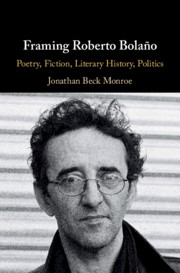Book contents
- Framing Roberto Bolaño
- Framing Roberto Bolaño
- Copyright page
- Dedication
- Contents
- Acknowledgments
- Abbreviations
- Introduction Unpacking Bolaño’s Library
- Part One
- Chapter 1 “Undisciplined Writing”
- Chapter 2 Poetry as Symptom and Cure
- Chapter 3 The Novel’s Regimes Made Visible
- Part Two
- Part Three
- Part Four
- Conclusion From the Known to the Unknown University
- Notes
- Index
Chapter 1 - “Undisciplined Writing”
from Part One
Published online by Cambridge University Press: 09 September 2019
- Framing Roberto Bolaño
- Framing Roberto Bolaño
- Copyright page
- Dedication
- Contents
- Acknowledgments
- Abbreviations
- Introduction Unpacking Bolaño’s Library
- Part One
- Chapter 1 “Undisciplined Writing”
- Chapter 2 Poetry as Symptom and Cure
- Chapter 3 The Novel’s Regimes Made Visible
- Part Two
- Part Three
- Part Four
- Conclusion From the Known to the Unknown University
- Notes
- Index
Summary
Questions of genre, of the commodification of genres and of genres as commodities, of their specialization and marketability, questions central to the institutionalization of creative writing in the academy over the past several decades, preoccupied Bolaño early on when the idea of making a living from writing appeared beyond reach. Written in 1980 but only published in 2002 (its English translation not appearing until 2010), Amberes/Antwerp has aptly been called the “Big Bang of the Bolaño universe.” Recalling Mikhail Bakhtin’s distinction between the novel’s characteristically dialogical, heteroglossic investments and poetry’s more monological tendencies, Antwerp pursues a consistently dialogic, heteroglossic self-questioning. Oscillating between minimalist narrative and meta-lingual, meta-fictional, meta-textual gestures, it continually stages its own suspension and recommencing. Torn between the pleasure and urgency of a “tax-free” poetic discourse and the commercial viability of the detective novel, the Bolaño of Antwerp aspires to write not “novels that are copies of other novels” but a genreless text in which he can affirm, without reserve, that “‘the only beautiful thing here is the language.’” Positioned roughly halfway between Baudelaire’s Le Spleen de Paris and Rimbaud’s Illuminations, Antwerp remains Bolaño’s most disjunctively Rimbaldian performance.
Keywords
- Type
- Chapter
- Information
- Framing Roberto BolañoPoetry, Fiction, Literary History, Politics, pp. 23 - 35Publisher: Cambridge University PressPrint publication year: 2019

